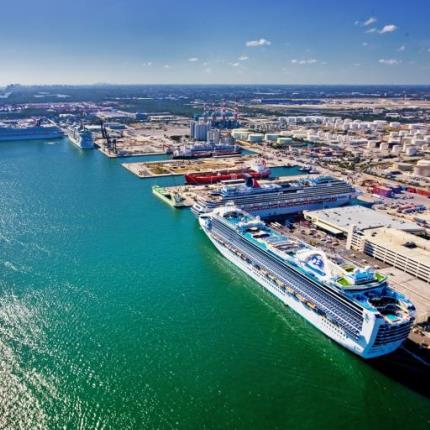 Talk about international trade in South Florida, and many people immediately think PortMiami.
Talk about international trade in South Florida, and many people immediately think PortMiami.
Broward County’s Port Everglades often gets overlooked even though the seaport handles more cargo by tonnage, by shipping containers and by value than its southern neighbor.
To help raise its profile, the Broward seaport worked with media company WorldCity to produce the first TradeNumbers report on a seaport. The company typically produces the reports on countries or areas.
“It’s important to get the word out to the local, national and international community about our trade,” said Glenn Wiltshire, Port Everglades deputy port director. “It helps port users and draws more business.”
Last year, Port Everglades reported record trade with the world for the fourth straight year, handling $27.15 billion in goods, up 6.75 percent from the previous year, the new report found. That growth was stronger than the 0.36 percent gain in the U.S. trade as a whole last year. The value of goods handled also surpassed the $23.71 billion imported and exported at PortMiami, where trade declined by 2.4 percent last year, WorldCity found in its 64-page publication.
Port Everglades last year ranked No. 14 among all seaports nationwide by value of trade, trailing far behind the $290.18 billon handled by the Port of Los Angeles. That seaport handles mainly imports from Asia and has a $210.2 billion trade deficit of imports exceeding exports, the census numbers show.
In contrast, Port Everglades has more balance between imports and exports, based largely on shipments to and from Latin America and the Caribbean. It had a slim surplus last year, with $13.62 billion in exports (including many high-tech goods) and $13.51 in imports (including fuel products), the report said.
Because Port Everglades is the principal entry point for fuel for southeast Florida, Venezuela ranked as the top trade partner by value for the seaport in 2014. Trade with that oil-exporting nation totaled $2.61 billion last year, down 10.6 percent from a year earlier, partly because of lower oil prices.
The port’s second- and third-largest trade partners last year, Honduras and Dominican Republic, both are big importers of U.S. cotton that their factories process it into clothes sold back to the U.S. through the port. Trade with Honduras hit $2.42 billion and with Dominican Republic $1.84 billion last year, the data show.
For the first seven months of this year, Port Everglades trade rose marginally, WorldCity President Ken Roberts told a luncheon audience Friday in presenting the report. Exports rose 3 percent and imports fell 4 percent, largely because of declining prices for fuel, Roberts said.
That’s a better performance than the U.S. as a whole for that same period. U.S. trade with the world through July fell by 4 percent, largely because of cheaper oil prices, WorldCity numbers show.
For many in the Port Everglades business community, from tenants to vendors, the new report offered tangible evidence of how much the seaport has grown and how it deserves appreciation as an economic engine for Broward and beyond.
“Our pride,” said Margaret Kempel, executive director of the Port Everglades Association, “is not unfounded.”
Port Everglades ‘Top Exports’ In 2014:
- Printers, $568.8M – Down 0.1 percent from 2013
- Computers, $459.4M – Up 4.3 percent
- Cotton, $418.1M – Up 31.3 percent
- Motor Vehicle Parts, $368.1M – Down 5.2 percent
- Motor Vehicles, $361.2M – Down 8.3 percent
Port Everglades ‘Top Imports’ In 2014:
- Refined Petroleum, $3.4 B – Up 4.4 percent
- Sweaters, Pullovers, Vests, $923.6M – Up 21.4 percent
- T-shirts, $882.7M – Up 25.4 percent
- Medical Devices, $780.1M – Up 14.9 percent
- Whiskey, Rum, Gin, Vodka, $354.2M – Up 2.1 percent
Source: Port Everglades TradeNumbers, WorldCity analysis of U.S. census data
Source: SunSentinel

